外研版七年级下册英语期末专项练习:改写句子(含答案解析)
文档属性
| 名称 | 外研版七年级下册英语期末专项练习:改写句子(含答案解析) | 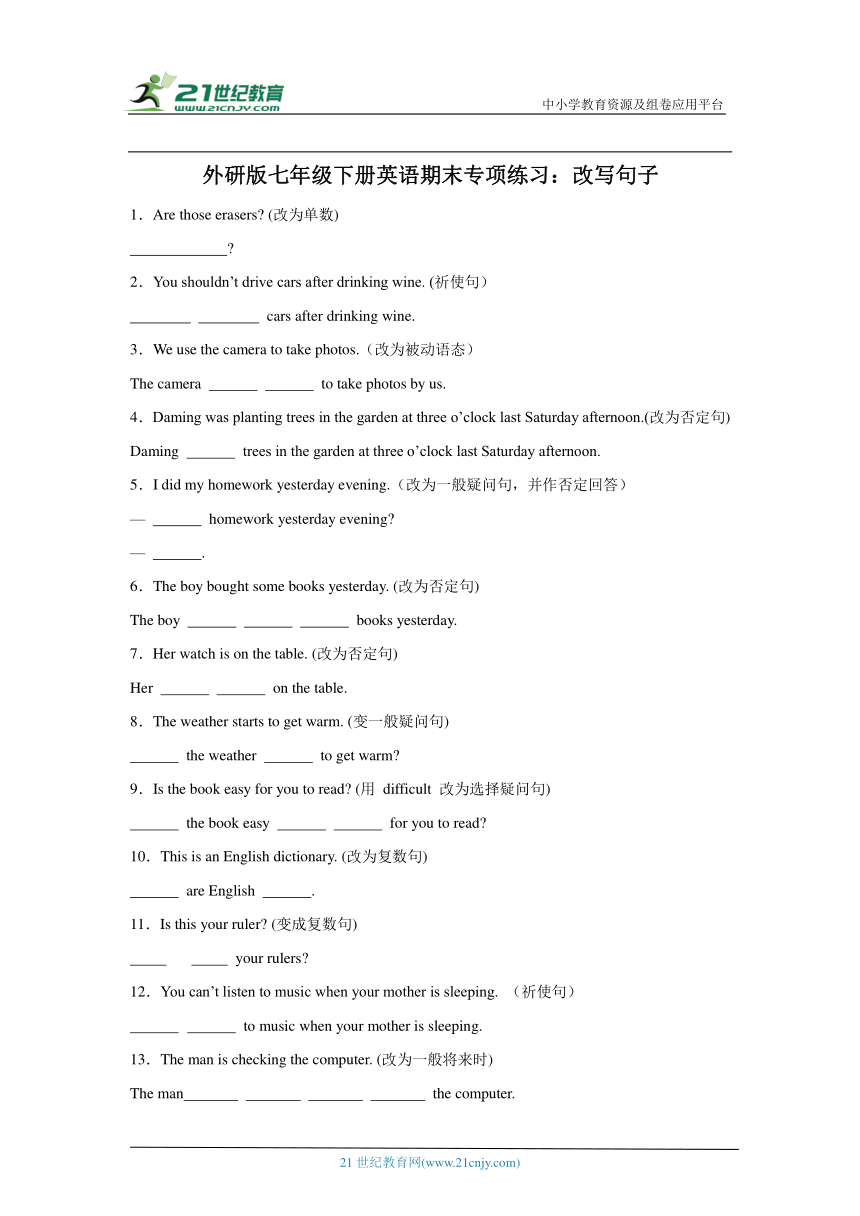 | |
| 格式 | docx | ||
| 文件大小 | 415.4KB | ||
| 资源类型 | 试卷 | ||
| 版本资源 | 外研版 | ||
| 科目 | 英语 | ||
| 更新时间 | 2024-05-10 15:37:47 | ||
图片预览

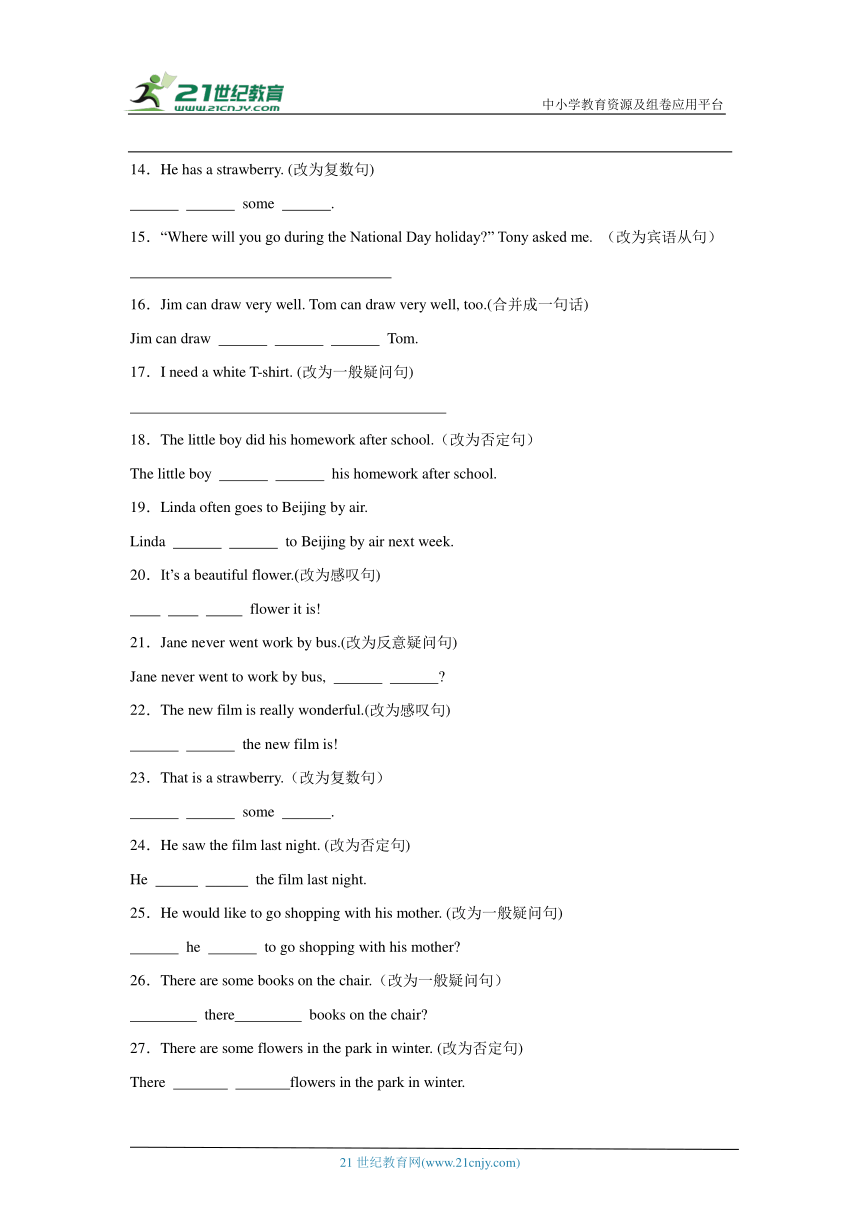
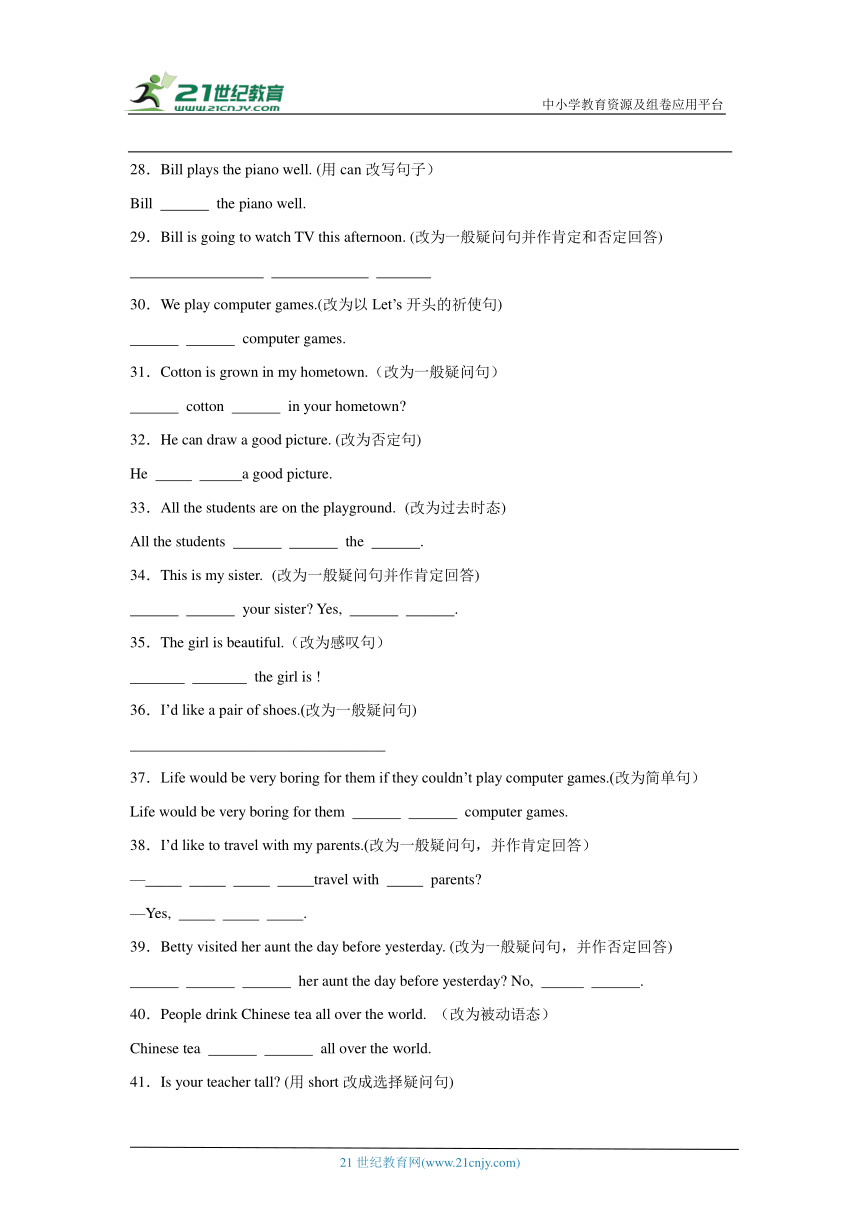
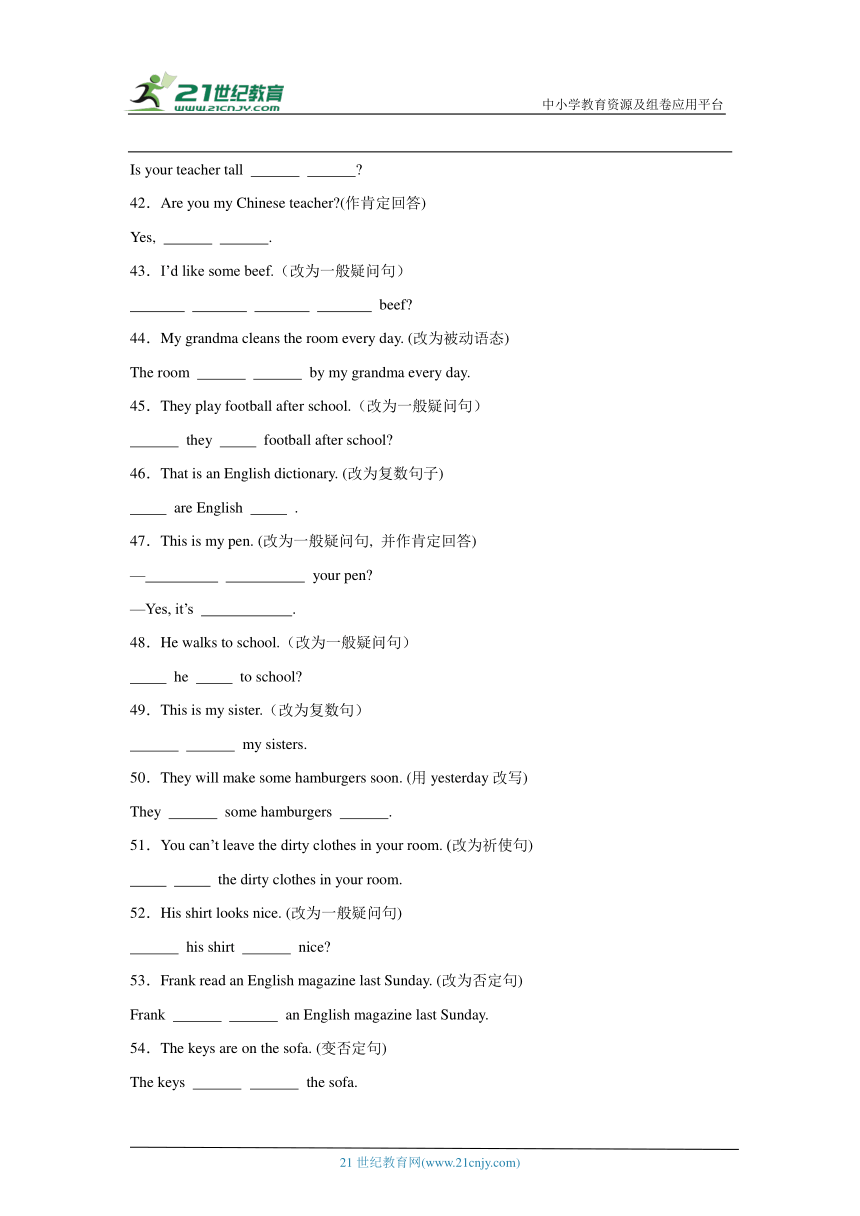
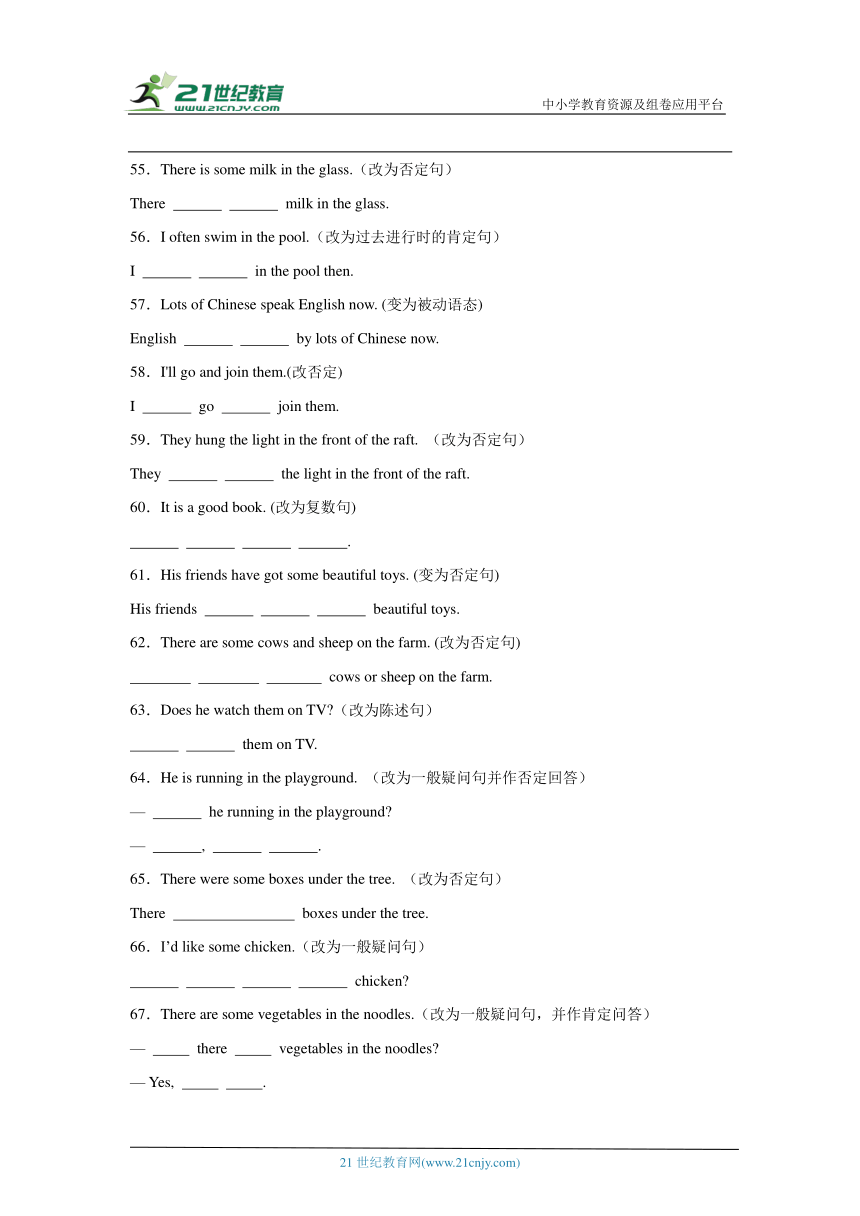
文档简介
中小学教育资源及组卷应用平台
中小学教育资源及组卷应用平台
外研版七年级下册英语期末专项练习:改写句子
1.Are those erasers (改为单数)
2.You shouldn’t drive cars after drinking wine. (祈使句)
cars after drinking wine.
3.We use the camera to take photos.(改为被动语态)
The camera to take photos by us.
4.Daming was planting trees in the garden at three o’clock last Saturday afternoon.(改为否定句)
Daming trees in the garden at three o’clock last Saturday afternoon.
5.I did my homework yesterday evening.(改为一般疑问句,并作否定回答)
— homework yesterday evening
— .
6.The boy bought some books yesterday. (改为否定句)
The boy books yesterday.
7.Her watch is on the table. (改为否定句)
Her on the table.
8.The weather starts to get warm. (变一般疑问句)
the weather to get warm
9.Is the book easy for you to read (用 difficult 改为选择疑问句)
the book easy for you to read
10.This is an English dictionary. (改为复数句)
are English .
11.Is this your ruler (变成复数句)
your rulers
12.You can’t listen to music when your mother is sleeping. (祈使句)
to music when your mother is sleeping.
13.The man is checking the computer. (改为一般将来时)
The man the computer.
14.He has a strawberry. (改为复数句)
some .
15.“Where will you go during the National Day holiday ” Tony asked me. (改为宾语从句)
16.Jim can draw very well. Tom can draw very well, too.(合并成一句话)
Jim can draw Tom.
17.I need a white T-shirt. (改为一般疑问句)
18.The little boy did his homework after school.(改为否定句)
The little boy his homework after school.
19.Linda often goes to Beijing by air.
Linda to Beijing by air next week.
20.It’s a beautiful flower.(改为感叹句)
flower it is!
21.Jane never went work by bus.(改为反意疑问句)
Jane never went to work by bus,
22.The new film is really wonderful.(改为感叹句)
the new film is!
23.That is a strawberry.(改为复数句)
some .
24.He saw the film last night. (改为否定句)
He the film last night.
25.He would like to go shopping with his mother. (改为一般疑问句)
he to go shopping with his mother
26.There are some books on the chair.(改为一般疑问句)
there books on the chair
27.There are some flowers in the park in winter. (改为否定句)
There flowers in the park in winter.
28.Bill plays the piano well. (用can改写句子)
Bill the piano well.
29.Bill is going to watch TV this afternoon. (改为一般疑问句并作肯定和否定回答)
30.We play computer games.(改为以Let’s开头的祈使句)
computer games.
31.Cotton is grown in my hometown.(改为一般疑问句)
cotton in your hometown
32.He can draw a good picture. (改为否定句)
He a good picture.
33.All the students are on the playground. (改为过去时态)
All the students the .
34.This is my sister. (改为一般疑问句并作肯定回答)
your sister Yes, .
35.The girl is beautiful.(改为感叹句)
the girl is !
36.I’d like a pair of shoes.(改为一般疑问句)
37.Life would be very boring for them if they couldn’t play computer games.(改为简单句)
Life would be very boring for them computer games.
38.I’d like to travel with my parents.(改为一般疑问句,并作肯定回答)
— travel with parents
—Yes, .
39.Betty visited her aunt the day before yesterday. (改为一般疑问句,并作否定回答)
her aunt the day before yesterday No, .
40.People drink Chinese tea all over the world. (改为被动语态)
Chinese tea all over the world.
41.Is your teacher tall (用short改成选择疑问句)
Is your teacher tall
42.Are you my Chinese teacher (作肯定回答)
Yes, .
43.I’d like some beef.(改为一般疑问句)
beef
44.My grandma cleans the room every day. (改为被动语态)
The room by my grandma every day.
45.They play football after school.(改为一般疑问句)
they football after school
46.That is an English dictionary. (改为复数句子)
are English .
47.This is my pen. (改为一般疑问句, 并作肯定回答)
— your pen
—Yes, it’s .
48.He walks to school.(改为一般疑问句)
he to school
49.This is my sister.(改为复数句)
my sisters.
50.They will make some hamburgers soon. (用yesterday改写)
They some hamburgers .
51.You can’t leave the dirty clothes in your room. (改为祈使句)
the dirty clothes in your room.
52.His shirt looks nice. (改为一般疑问句)
his shirt nice
53.Frank read an English magazine last Sunday. (改为否定句)
Frank an English magazine last Sunday.
54.The keys are on the sofa. (变否定句)
The keys the sofa.
55.There is some milk in the glass.(改为否定句)
There milk in the glass.
56.I often swim in the pool.(改为过去进行时的肯定句)
I in the pool then.
57.Lots of Chinese speak English now. (变为被动语态)
English by lots of Chinese now.
58.I'll go and join them.(改否定)
I go join them.
59.They hung the light in the front of the raft. (改为否定句)
They the light in the front of the raft.
60.It is a good book. (改为复数句)
.
61.His friends have got some beautiful toys. (变为否定句)
His friends beautiful toys.
62.There are some cows and sheep on the farm. (改为否定句)
cows or sheep on the farm.
63.Does he watch them on TV (改为陈述句)
them on TV.
64.He is running in the playground. (改为一般疑问句并作否定回答)
— he running in the playground
— , .
65.There were some boxes under the tree. (改为否定句)
There boxes under the tree.
66.I’d like some chicken.(改为一般疑问句)
chicken
67.There are some vegetables in the noodles.(改为一般疑问句,并作肯定问答)
— there vegetables in the noodles
— Yes, .
68.He likes pears and oranges very much.(改成反义句)
He pears oranges .
69.Every week he goes to the library.(用last week 改写)
week he to the library.
70.You may go shopping with me. (改为一般疑问句)
go shopping with you
71.He did homework yesterday evening. (改成否定句)
He homework yesterday evening.
72.You mustn’t say anything too personal in England. (改为祈使句)
anything too personal in England.
73.Millie often writes e-mails to her parents. (用yesterday evening改写)
Millie e-mails to her parents .
74.They check every passenger’s luggage at the underground station. (改为被动语态)
Every passenger’s luggage at the underground station.
75.Those are erasers. (改为单数句)
is eraser.
76.I play the piano every day. (用 now 改写句子)
77.I often help my friend and he often helps me.(合并为一句)
My friend and I often help .
78.It is my watch. (改为复数形式)
my .
79.The girl is very brave. (改为感叹句)
What !
How !
80.He was an honest boy. (改为感叹句)
an boy he was!
81.I’d like a bowl of noodles.(改为一般疑问句)
you a bowl of noodles
82.He needed some help from his classmates. (否定句)
He need help from his classmates.
83.That is my red pen. (改为复数形式)
my red .
84.He wants to have some rice for breakfast. (改为一般疑问句)
he want to have rice for breakfast
85.They will learn a lot about the culture of China. (改为一般疑问句)
a lot about the culture of China
86.There are some Chinese books on the desk. (改为否定句)
There Chinese books on the desk.
87.The robot made Mr Wang’s life much easier. (改为反意疑问句)
The robot made Mr Wang’s life much easier,
88.The old lady preferred to live in a small village. (改为一般疑问句)
the old lady to live in a small village
89.People built the bridge to connect the island with the mainland area. (改为被动语态)
The bridge to connect the island with the mainland area.
90.Those are Lucy’s erasers. (改为单数句)
is .
91.We plant lots of trees along the streets every year. (变为被动语态)
92.That man can play chess.(改为一般疑问句)
that man chess
93.They always ask me.(用Helen作主语改写句子)
Helen .
94.They grow rice in the south.
Rice in the south by them.
95.Mary often did some washing when she was young.(改为否定句)
Mary often do washing when she was young.
96.That's an exciting story, (完成反意疑问句)
97.Tom is going to bring us some drinks. (改为一般疑问句)
Tom you any drinks
98.Jim can play soccer. (改为一般疑问句)
Jim soccer
99.Sophia was listening to music when her mother came back from work. (改为否定句)
Sophia to music when her mother came back from work.
100.There are some children on the bus. (改为否定句)
There children on the bus.
中小学教育资源及组卷应用平台
中小学教育资源及组卷应用平台
21世纪教育网(www.21cnjy.com)
21世纪教育网(www.21cnjy.com)
参考答案:
1.Is that an eraser
【详解】句意:那些是橡皮擦吗?are是单数是is,those的单数是that,erasers的单数是eraser,单数前面用不定冠词修饰,eraser以元音音素开头,应用an修饰,故填Is that an eraser。
2. Don’t drive
【详解】句意:你不应该在喝酒后开车。原句是否定句,改为祈使句需表示“酒后不能开车”,应用助动词don’t开头,首字母需大写,其后接动词原形drive。故填Don’t;drive。
3. is used
【详解】句意:我们使用照相机来拍照。考查一般现在时的主动语态改为被动语态。原句中的“use”说明句子采用一般现在时,改为被动语态时,其谓语结构为:am/is/are+过去分词。句子的主语The camera为单数名词,因此be动词应用is,动词use的过去分词为used。故填is;used。
4.wasn’t planting
【详解】句意:上周六下午三点,大明正在花园里植树。考查肯定句变否定句。句子含有be动词,变否定句时在be动词后加not,was not=wasn’t。故填wasn’t planting。
5. Did you do your No, I didn’t
【详解】句意:昨天晚上我做了家庭作业。题目要求改为一般疑问句并作否定回答。原句主语改为you,原句谓语did为实义动词,在疑问句中应用助动词did,谓语did改为原形do,原句形容词性物主代词my改为your。疑问句为“Did you do your homework yesterday evening ”,其否定回答为“No, I didn’t”。故填Did you do your;No, I didn’t。
6. didn’t buy any
【详解】句意:这个男孩昨天买了一些书。原句时态为一般过去时,且含有实义动词“bought”,故改为否定句应用助动词didn’t,后接动词原形buy;原句的some改为any。故填didn’t;buy;any。
7. watch isn’t
【详解】句意:她的手表在桌子上。考查否定句。根据原句主语是“watch”,所以第一个空应用watch;be动词的否定是在be后加not,所以第二个空应用is not的缩写式isn’t。故填watch;isn’t。
8. Does start
【详解】句意:天气开始变暖。根据“starts”可知,时态是一般现在时,且主语是第三人称单数,故疑问句的助动词用“does”,置于句首,首字母大写,助动词后面接动词原形。故填Does;start。
9. Is or difficult
【详解】句意:这本书对你来说读起来简单吗?根据题干可知,选择疑问句应当是两个选项之间用or连接,此处应当是easy or difficult。故填Is;or;difficult。
10. These dictionaries
【详解】此题考查将句子由单数变为复数。this的复数形式是these,首字母要大写;dictionary的复数形式是dictionaries。故答案为:(答题空1)These (答题空2)dictionaries
11. Are these
【详解】句意:这是你的尺子吗?this的对应复数是these“这些”,系动词用are,故填Are;these。
12. Don’t listen
【详解】句意:你不能在你妈妈睡觉的时候听音乐。否定祈使句用“Don’t do sth”表示,故填Don’t;listen。
13. is going to check
【详解】一般将来时需用be going to do或will do结构。man是单数第三人称,系词需用is;根据句意结构,可知填(1). is (2). going (3). to (4). check。
14. They have strawberries
【详解】句意:他有一个草莓。根据题目要求可知,原句要改成复数句。原句主语是“he”是第三人称单数,需修改为第三人称复数“they”,置于句首,首字母要大写,故填“They”;谓语动词需修改为复数,故用“have”;strawberry草莓,“some一些”后接可数名词复数,故用“strawberries”。故填They; have; strawberries。
15.Tony asked me where I would go during the National Day holiday.
【详解】句意:“国庆假期期间你会去哪里?” 托尼问我。根据句子要求可知,原句改为宾语从句,从句应是陈述句语序。主句:Tony asked me,后接宾语从句。宾语从句由where引导,you改为I,作主语;would go作谓语,主句时态是一般过去时,此时从句也用过去的时态,为一般过去时,所以will改为would;during the National Day holiday作时间状语,位于句末。故填Tony asked me where I would go during the National Day holiday.
16. as well as
【详解】句意:吉姆画得很好。汤姆也能画得很好。原句可改为“吉姆画得和汤姆一样好”,as…as“和……一样”,中间接形容词或副词原级,副词well修饰动词draw,故填as;well;as。
17.Do you need a white T-shirt
【详解】句意:我需要一件白色的t恤。根据题目要求可知,改为一般疑问句,原句中含有实意动词need,且时态是一般现在时,主语非三单,借助助动词do位于句首构成疑问句,第一人称I改为第二人称you,故填Do you need a white T-shirt
18. didn’t do
【详解】句意:那个小男孩放学后做作业。考查肯定句改为否定句。原句中的“did”说明句子用一般过去时,did是实义动词do的过去式。改为否定句,应借助助动词did+not缩略为didn’t,后接动词原形do。故填didn’t;do。
19. will go
【详解】句意:Linda经常乘飞机去北京。根据next week“下周”可知,原句时态需变为一般将来时,谓语动词用will do的形式,故填will;go。
20. What a beautiful
【详解】句意:这是一朵美丽的花。要求改为感叹句,中心词flower是可数名词,故此感叹句由what引导,其结构为What+a/an+形容词+名词+主谓! beautiful以辅音音素开头,故不定冠词用a。故填What;a;beautiful。
21. did she
【详解】句意:简从不乘公共汽车去上班。根据“never”可知反意疑问句的疑问部分用肯定形式;根据“Jane never went...”可知句子是一般过去时,疑问部分借助助动词did,主语用代词she。故填did;she。
22. How wonderful
【详解】句意:这部新电影真的很精彩。结合转换句给出部分可知,此处感叹句的中心词是形容词,应用how引导感叹句,符合结构“How+形容词或副词+主语+谓语!”,故填How;wonderful。
23. Those are strawberries
【详解】句意:那是一个草莓。that的复数是those,is的复数是are,strawberry的复数是strawberries,故填Those;are;strawberries。
24. didn’t see
【详解】句意:他昨晚看了这部电影。题干是含有实义动词saw的一般过去时,变否定句需要加助动词did,did与not可以缩写成didn’t,其后跟动词原形,saw需要变为原形see。故填didn’t;see。
25. Would like
【详解】句意:他想和妈妈一起去逛街。根据题干,改为一般疑问句应把情态动词would提前,句首字母需大写,其余不变。故填Would;like。
26. Are any
【详解】句意:在椅子上有一些书。疑问句将are提到句首,且把some改成any,故填Are;any。
27. aren’t any
【详解】句意:冬天公园里有一些花。改为否定句,在be动词are后加not,缩写为aren’t;原句的some改为any。故填aren’t;any。
28.can play
【详解】句意:比尔钢琴弹得很好。用can改写句子时,can放在主语之后谓语动词之前,其后谓语动词变为原形。故填can play。
29. Is Bill going to watch TV this afternoon Yes, he is. No, he isn’t
【详解】Bill is going to watch TV this afternoon. (改为一般疑问句并做肯定和否定回答) 根据一般疑问句把is提到主语前,故答案是(1) Is Bill going to watch TV this afternoon (2) Yes,he is. (3) No,he isn’t
30. Let’s play
【详解】根据原句改写要求,第一空直接填Let’s。这是祈使句,let’s 后加动词原形,根据句子结构,填play。故填Let’s;play。
31. Is grown
【详解】句意:我的家乡种植棉花。考查一般疑问句。原句是一般现在时的被动语态,主语是Cotton,谓语动词是is grown,此句型变成一般疑问句则是把be动词提前,其他成分不变,“Is”的首字母要大写。故填Is;grown。
32. can’t draw
【详解】句意:他能画一幅好画。原句有can,变为否定句,需在can后加not,动词用原形。故填can’t;draw。
33. were on playground
【详解】句意:所有的学生都在操场上。本题要求改为过去时态,动词“are”应变为过去式were,其他成分不变。故填were;on;playground。
34. Is this she is
【详解】句意:这是我的姐姐。原句是一般现在时,变成一般疑问句,将be动词“is”放在“this”前面。首字母“i”大写。回答用“she”,be动词是“is”。故填Is;this;she;is。
35. How beautiful
【详解】句意:这个女孩很漂亮。根据给出的句式可知,应是how引导的感叹句,构成形式为:How+形容词/副词+主语+谓语!how句首首字母大写。故填How;beautiful。
36.Would you like a pair of shoes
【详解】句意:我想要一双鞋。含有would like的陈述句变一般疑问句直接把would提前,第一人称I要改为第二人称you,故答案为Would you like a pair of shoes
37. without playing
【详解】句意:如果他们不能玩电脑游戏,生活对他们来说会很无聊。题目要求改为简单句,根据“if they couldn’t play computer games”可知,不玩电脑游戏对他们来说会很无聊,此处可以借助介词进行改写,without是介词,意为“没有”,后接动名词playing。故填without;playing。
38. Would you like to your I’d like to
【详解】句意:我想和我的父母去旅行。本句使用“主语+would like to do”某人想要做某事…;其中would为助动词,将陈述句变为一般疑问句时只需把would提前,注意原句中的第一人称要改为第二人称,故本题疑问句为:Would you like to travel with your parents
Would you like/love to do…句型意思是“你想做….吗?”,用于礼貌地提出建议或邀请。肯定回答通常是:Yes, I’d like/love to. 故答语为:Yes, I’d like/love to.
39. Did Betty visit she didin’t
【详解】句意:贝蒂前天去看望她的姑妈。句子是一般过去时,谓语动词visited是行为动词,改成一般疑问句时,将Did置于主语Betty前,谓语动词用原形visit。否定回答是“No, 人称代词主格+didn’t”,主语Betty对应的人称代词主格是she。故填Did;Betty;visit;she;didn’t。
40. is drunk
【详解】句意:全世界的人都喝中国茶。考查主动语态改为被动语态。原句是一般现在时,应改为一般现在时的被动语态,其结构为:am/is/are+过去分词。主语Chinese tea为不可数名词,be动词应用is,动词drink的过去分词为drunk。故填is;drunk。
41. or short
【详解】句意:你的老师高吗?选择疑问句是由“一般疑问句+or+选择部分”构成,short和tall是并列的选择关系。故填or;short。
42. I am
【详解】句意:你是我的语文老师吗?原句中主语是第二人称“you”,变成肯定句或回答时要用第一人称I,对应的be动词是am,故填I am。
43. Would you like some
【详解】句意:我想要一些牛肉。I’d是I would的缩写,变一般疑问句时,would提前,I改为you,表示希望得到肯定回答,所以用some。故填Would;you;like;some。
44. is cleaned
【详解】句意:我的奶奶每天打扫房间。原句为一般现在时,一般现在时的被动语态的结构为:am/is/are + done;主语为the room,助动词用is;clean的过去分词为cleaned;故填is;cleaned。
45. Do play
【详解】句意:他们在放学后踢足球。根据语境可知,本句是一般现在时,因“play”是实义动词,助动词用do;因是一般疑问句,动词用原形,故填Do;play。
46. Those dictionaries
【详解】句意:那是一本英语词典。that那,那个,其复数形式为those,意为“那些”;变为复数句子时,将原句中的不定冠词“an”去掉,并将单数名词dictionary变为复数dictionaries,故填Those;dictionaries。
47. Is
this
mine
【详解】句意:这是我的新钢笔。原句为含有be动词的陈述句,改为一般疑问句把be动词提前到主语前。答句“my pen”用名词性物主代词mine代替。故填Is;this;mine。
48. Does walk
【详解】句意:他走路去上学。由“walks”可知陈述句为一般现在时且句中没有be动词,在改一般疑问句时要借助助动词do或does,结合第三人称单数“he 他”,选择助动词does;助动词后动词用原形,所以walks改成walk,注意句子首字母大写。故答案为Does;walk。
49. These are
【详解】句意:这是我的姐姐。题目要求改为复数句,原句指示代词This改成These,原句be动词is改为are。故填These;are。
50. made yesterday
【详解】句意:他们很快就会做一些汉堡包。时间状语改为“yesterday”,时态为一般过去时,动词要用过去式,make的过去式为made。故填made;yesterday。
51. Don’t leave
【详解】句意:你不能把脏衣服留在房间里。根据can’t可知是改为否定祈使句,结构为Don’t do sth.“不要做某事”。故填Don’t;leave。
52. Does look
【详解】句意:他的衬衫看起来不错。原句是含有实义动词的一般现在时,主语是单数名词,助动词用does,助动词提到主语前,后接动词原形,故填Does;look。
53. didn’t read
【详解】句意:弗兰克上星期天读了一本英语杂志。考查肯定句改为否定句。原句时态为一般过去时,谓语动词是实意动词,改为否定句要借助助动词didn’t,后加动词原形,read过去时和原形都是read,故填didn’t;read。
54. aren’t on
【详解】句意:钥匙在沙发上。原句是含be动词are的肯定句,变否定句直接在are后面加not,are与not缩写成aren’t,其余不变。故填aren’t;on。
55. isn’t any
【详解】句意:玻璃杯里有一些牛奶。题目要求改为否定句。句子谓语为is,其否定形式为isn’t,原句some在否定句中应用any替换。故填isn’t;any。
56. was swimming
【详解】句意:我经常在游泳池里游泳。过去进行时的结构是was/were doing,主语是I,be动词用was。故填was;swimming。
57. is spoken
【详解】句意:现在很多中国人说英语。原句时态是一般现在时,所以变为被动语态后,时态仍然保持不变,一般现在时的被动语态结构是am/is/are done,主语是English,所以be动词用is,speak要变成过去分词spoken。故填is;spoken。
58. won't or
【详解】句意:我将要去加入他们。原句是一般将来时will do结构,否定句在助动词will后加not,可缩写为won't;否定句中and应改为or。故填won't;or。
59. didn’t hang
【详解】句意:他们把灯挂在筏子的前面。本题要求改为否定句,原句谓语动词hung是hang的过去式形式,否定句应用助动词did构成,与not缩写为didn’t,后面的动词用原形。故填didn’t hang。
60. They are good books
【详解】句意:这是一本好书。it的复数是they,句首首字母大写;is的复数是are;a good book的复数是good books。故填They;are;good;books。
61. haven’t got any
【详解】句意:他的朋友们有一些漂亮的玩具。根据“have got…”可知,变否定时在助动词have后加not,缩写为haven’t;否定句中some改为any。故填haven’t;got;any。
62. There aren’t any
【详解】句意:农场上有一些牛羊。含be动词的句子变否定句时,直接在be动词后加not即可,some“一些”用在肯定句中,变否定句时,要变成any,故填There;aren’t;any。
63. He watches
【详解】句意:他在电视上看它们吗?句子是一般疑问句,结合助动词does可知,句子用一般现在时,主语是he,改为陈述句,谓语动词watch应该用第三人称单数形式watches。故填He;watches。
64. Is Yes he is
【详解】句意:他正在操场上跑步。该句是现在进行时,带有be动词is,变一般疑问句时把be动词is提前,肯定回答为“Yes, sb. is.”,主语为he,句首首字母大写,故填Is;Yes;he;is。
65.weren’t any
【详解】句意:树下面有一些盒子。改为否定句,在were后加not,缩写为weren’t。且some改为any。故填weren’t any。
66. Would you like some
【详解】句意:我想要点鸡肉。考查陈述句改一般疑问句。I’d为I would的缩写形式,在含有情态动词的陈述句中,改为一般疑问句,应将情态动词would提到句首,首字母大写,主语I改为you,后接动词原形like。因改成的一般疑问句是询问对方意见,并期待得到对方的肯定答复,因此应用some来修饰名词。故填Would;you;like;some。
67. Are any there are
【详解】此题考查改为一般疑问句,并作肯定问答。题干“There are some vegetables in the noodles.”是there be句型,直接把are提前大写,再把some改为any;答语就用there be来回答。故答案为:(1). Are (2). any (3). there (4). are
68. doesn’t like or at all
【详解】句意:他非常喜欢吃梨和橘子。题意:反义句。根据题意,可知“他非常喜欢吃梨和橘子。”的反义句是“他根本不喜欢吃梨和橘子。(He doesn’t like pears or oranges at all.)” 结合提示可知答案是(1). doesn’t (2). like (3). or (4). at (5). all。
69. Last went
【详解】last week上周,用于一般过去时,在句首需大写首字母,动词需用过去式;go的过去式是不规则变化went;根据句意结构和中英文提示,可知填(1). Last (2). went。
70. May I
【详解】句意:你可以和我一起去购物。当句中有情态动词时,疑问句需把情态动词提前。结合题干可知,提前情态动词may;主语you改为第一人称I。故填May;I。
71.didn’t do
【详解】句意:他昨晚做作业了。原句中did是动词过去式,否定句借助于助动词didn’t,后接动词原形do,故填didn’t do。
72. Don’t say
【详解】句意:在英国,你不能说太私人的话。根据题干可知,句子为否定句,改为祈使句,应在句首加don’t,句首首字母d需大写,后接动词原形,say“说”,动词。故填Don’t;say。
73. wrote yesterday evening
【详解】yesterday evening是过去的时间,因此改后的时态为过去时。write的过去式为wrote。故填wrote;yesterday evening。
74. is checked
【详解】句意:他们在地铁站检查每位乘客的行李。原句是一般现在时,谓语动词是“check检查”;变换后的被动句属于一般现在时的被动语态,谓语形式是am/is/are+done;原来的宾语“every passenger’s luggage”位于句首作主语,是第三人称单数,因此be动词用is,check变为过去分词checked。故填is;checked。
75. That an
【详解】句意:那些是橡皮。Those的单数是That,erasers的单数是an eraser。故填That;an。
76.I am playing the piano now.
【详解】句意:我每天弹钢琴。用now改写句子,应将原句的一般现在时改为现在进行时,构成为:be + 动词的现在分词;主语为第一人称I,be动词应用am;play的现在分词形式是playing;now为时间状语。故填I am playing the piano now.
77. each other
【详解】句意:我经常帮助我的朋友,并且他经常帮助我。根据“I often help my friend and he often helps me.”可知,是互相帮助,each other“互相”。故填each;other。
78. They’re watches
【详解】句意:这是我的手表。It is的复数是They are,可缩写为They’re;watch的复数是watches。故填They’re;watches。
79. a brave girl she is brave the girl is
【详解】句意:这个女孩很勇敢。此题要求改为感叹句,感叹句是由what和how引导的;what引导的感叹句为:What (a/an)+形容词+名词+主语+谓语;how引导的感叹句为:How+形容词/副词+主语+谓语。这题的girl是单数名词,brave是形容词,且是以辅音音素开头的单词,前面用不定冠词a;所以这题的感叹句为:What a brave girl she is或How brave the girl is。故填a;brave;girl;she;is;brave;the;girl;is。
80. What honest
【详解】句意:他是个诚实的男孩。根据句中结构可知,可用感叹句结构为“What a/an+adj.+n.+主语+谓语”,位于句首首字母大写。故填What;honest。
81. Would like
【详解】肯定句含有would like,变一般疑问句时,把would提前并大写;代词是第一人称应换成第二人称。故答案为(1). Would (2). like。
82. didn’t any
【详解】句意:他需要同学们的帮助。根据“needed”可知,句子谓语动词为实义动词,且为一般过去时,故变否定句时,应用助动词did加not,可缩写为didn’t,后接动词原形;根据“some”可知,some往往用于肯定句中,在否定句和疑问句中要变为any。故填didn’t;any。
83. Those are pens
【详解】句意:那是我的红色钢笔。根据题干可知,句中“that”意为“那个”,为单数形式,其对应的复数是those“那些”;单数“is”对应的复数是are;单数“pen”对应的复数是pens。故填Those;are;pens。
84. Does any
【详解】句意:他早餐想要吃一些米饭。原句为含有实义动词的一般现在时,“wants”为动词第三人称单数形式,应借助助动词does构成一般疑问句,句首单词首字母d应大写,some变为any。故填Does;any。
85. Will they learn
【详解】句意:他们将学到很多关于中国文化的知识。原句含有will,变一般疑问句时,直接将will提到主语之前,其余不变。故填Will;they;learn。
86. aren’t any
【详解】句意:桌子上有一些语文书。否定句在are后加not,缩写为aren’t;some用于肯定句,否定句用any,故填aren’t;any。
87. didn’t it
【详解】句意:这个机器人让王先生的生活轻松多了。反意疑问句遵循“前肯后否,前否后肯”的原则,此处陈述部分是肯定式,疑问部分用否定式;根据“made”可知是一般过去时,助动词用didn’t,主语用代词it指代The robot。故填didn’t;it。
88. Did prefer
【详解】句意:这位老太太喜欢住在一个小村庄里。原句由谓语动词“preferred”推断为一般过去时态, 变为一般疑问句应在句首加助动词Did, 原过去式preferred变成其原形prefer。故填Did;prefer。
89.is built
【详解】句意:人们建造了一座桥来连接这座岛和大陆。句子是一般现在时,主语是“The bridge”单数概念,表达“被建”动词用一般现在时的被动结构“is built”。故填is built。
90. That Lucy’s eraser
【详解】句意:那些是露西的橡皮。those表示“那些”,变成单数形式是that,意为“那个”,句首首字母t大写;表示“露西的”仍然用名词所有格形式Lucy’s;复数名词erasers变成单数形式eraser。故填That;Lucy’s;eraser。
91.Lots of trees are planted along the streets by us every year./Lots of trees are planted along the streets every year./Every year lots of trees are planted along the streets by us./Every year lots of trees are planted along the streets.
【详解】句意:我们每年沿着街道种很多树。变为被动语态时,原句中的宾语“lots of trees”变为主语,表示复数,用are构成被动语态,谓语plant的过去分词为planted;地点状语“along the streets”置于谓语planted之后;原句中的主语“We”变为宾语,用宾格形式us,前面加介词by,意为“被”,时间状语every day可置于句末或句首。故填Lots of trees are planted along the streets by us every year./Lots of trees are planted along the streets every year./Every year lots of trees are planted along the streets by us./Every year lots of trees are planted along the streets.
92. Can play
【详解】句意:那个人会下棋。原句含有情态动词can,改为一般疑问句需将can提到句首并大写首字母,其后动词使用原形,故填Can;play。
93. always asks me
【详解】句意:他们总是问我。Helen作主语,动词要用三单形式;频度副词always放在实义动词ask前,其他不变,故填always;asks;me。
94. is grown
【详解】句意:他们在南方种植稻谷。“Rice”和“grow”之间是被动关系,应用被动语态。“rice”是不可数名词,故be动词用is;“grow”的过去分词是“grown”。故填is;grown。
95. didn’t any
【详解】句意:玛丽年轻时经常洗衣服。原句用一般过去时,动词是实义动词,变成否定要加助动词didn’t,加了助动词,原来的动词变成原形,原句中some“一些”要变成any,故填didn’t;any。
96. isn't it
【详解】句意:那是一个激动人心的故事,不是吗 反意疑问句遵循“前肯后否,前否后肯”的原则;本题中前半部分是肯定的,且原句是含有be动词is的一般现在时,所以疑问部分用否定形式isn't,主语that用it来替代;故填isn't;it。
97. Is going to bring
【详解】句意:汤姆会给我们拿些饮料。根据“Tom is going to bring us some drinks.”可知,把be动词is提到句首,首字母大写,其余部分不变;故填Is;going;to;bring。
98. Can play
【详解】句意:Jim会踢足球。原句是含有情态动词can的陈述句,变一般疑问句直接将can提到主语前,后跟动词原形。故填Can;play。
99.wasn’t listening
【详解】句意:当她妈妈下班回家的时候,索菲亚正在听音乐。改为否定句时,在be动词后加not,was not=wasn’t,后加现在分词listening。故填wasn’t listening。
100. are not any
【详解】句意:公共汽车上有一些孩子。“There be”句型的否定句直接在be后加not,肯定句中的“some”改为否定句时要改为any,故填are;not;any。
21世纪教育网(www.21cnjy.com)
21世纪教育网(www.21cnjy.com)
中小学教育资源及组卷应用平台
外研版七年级下册英语期末专项练习:改写句子
1.Are those erasers (改为单数)
2.You shouldn’t drive cars after drinking wine. (祈使句)
cars after drinking wine.
3.We use the camera to take photos.(改为被动语态)
The camera to take photos by us.
4.Daming was planting trees in the garden at three o’clock last Saturday afternoon.(改为否定句)
Daming trees in the garden at three o’clock last Saturday afternoon.
5.I did my homework yesterday evening.(改为一般疑问句,并作否定回答)
— homework yesterday evening
— .
6.The boy bought some books yesterday. (改为否定句)
The boy books yesterday.
7.Her watch is on the table. (改为否定句)
Her on the table.
8.The weather starts to get warm. (变一般疑问句)
the weather to get warm
9.Is the book easy for you to read (用 difficult 改为选择疑问句)
the book easy for you to read
10.This is an English dictionary. (改为复数句)
are English .
11.Is this your ruler (变成复数句)
your rulers
12.You can’t listen to music when your mother is sleeping. (祈使句)
to music when your mother is sleeping.
13.The man is checking the computer. (改为一般将来时)
The man the computer.
14.He has a strawberry. (改为复数句)
some .
15.“Where will you go during the National Day holiday ” Tony asked me. (改为宾语从句)
16.Jim can draw very well. Tom can draw very well, too.(合并成一句话)
Jim can draw Tom.
17.I need a white T-shirt. (改为一般疑问句)
18.The little boy did his homework after school.(改为否定句)
The little boy his homework after school.
19.Linda often goes to Beijing by air.
Linda to Beijing by air next week.
20.It’s a beautiful flower.(改为感叹句)
flower it is!
21.Jane never went work by bus.(改为反意疑问句)
Jane never went to work by bus,
22.The new film is really wonderful.(改为感叹句)
the new film is!
23.That is a strawberry.(改为复数句)
some .
24.He saw the film last night. (改为否定句)
He the film last night.
25.He would like to go shopping with his mother. (改为一般疑问句)
he to go shopping with his mother
26.There are some books on the chair.(改为一般疑问句)
there books on the chair
27.There are some flowers in the park in winter. (改为否定句)
There flowers in the park in winter.
28.Bill plays the piano well. (用can改写句子)
Bill the piano well.
29.Bill is going to watch TV this afternoon. (改为一般疑问句并作肯定和否定回答)
30.We play computer games.(改为以Let’s开头的祈使句)
computer games.
31.Cotton is grown in my hometown.(改为一般疑问句)
cotton in your hometown
32.He can draw a good picture. (改为否定句)
He a good picture.
33.All the students are on the playground. (改为过去时态)
All the students the .
34.This is my sister. (改为一般疑问句并作肯定回答)
your sister Yes, .
35.The girl is beautiful.(改为感叹句)
the girl is !
36.I’d like a pair of shoes.(改为一般疑问句)
37.Life would be very boring for them if they couldn’t play computer games.(改为简单句)
Life would be very boring for them computer games.
38.I’d like to travel with my parents.(改为一般疑问句,并作肯定回答)
— travel with parents
—Yes, .
39.Betty visited her aunt the day before yesterday. (改为一般疑问句,并作否定回答)
her aunt the day before yesterday No, .
40.People drink Chinese tea all over the world. (改为被动语态)
Chinese tea all over the world.
41.Is your teacher tall (用short改成选择疑问句)
Is your teacher tall
42.Are you my Chinese teacher (作肯定回答)
Yes, .
43.I’d like some beef.(改为一般疑问句)
beef
44.My grandma cleans the room every day. (改为被动语态)
The room by my grandma every day.
45.They play football after school.(改为一般疑问句)
they football after school
46.That is an English dictionary. (改为复数句子)
are English .
47.This is my pen. (改为一般疑问句, 并作肯定回答)
— your pen
—Yes, it’s .
48.He walks to school.(改为一般疑问句)
he to school
49.This is my sister.(改为复数句)
my sisters.
50.They will make some hamburgers soon. (用yesterday改写)
They some hamburgers .
51.You can’t leave the dirty clothes in your room. (改为祈使句)
the dirty clothes in your room.
52.His shirt looks nice. (改为一般疑问句)
his shirt nice
53.Frank read an English magazine last Sunday. (改为否定句)
Frank an English magazine last Sunday.
54.The keys are on the sofa. (变否定句)
The keys the sofa.
55.There is some milk in the glass.(改为否定句)
There milk in the glass.
56.I often swim in the pool.(改为过去进行时的肯定句)
I in the pool then.
57.Lots of Chinese speak English now. (变为被动语态)
English by lots of Chinese now.
58.I'll go and join them.(改否定)
I go join them.
59.They hung the light in the front of the raft. (改为否定句)
They the light in the front of the raft.
60.It is a good book. (改为复数句)
.
61.His friends have got some beautiful toys. (变为否定句)
His friends beautiful toys.
62.There are some cows and sheep on the farm. (改为否定句)
cows or sheep on the farm.
63.Does he watch them on TV (改为陈述句)
them on TV.
64.He is running in the playground. (改为一般疑问句并作否定回答)
— he running in the playground
— , .
65.There were some boxes under the tree. (改为否定句)
There boxes under the tree.
66.I’d like some chicken.(改为一般疑问句)
chicken
67.There are some vegetables in the noodles.(改为一般疑问句,并作肯定问答)
— there vegetables in the noodles
— Yes, .
68.He likes pears and oranges very much.(改成反义句)
He pears oranges .
69.Every week he goes to the library.(用last week 改写)
week he to the library.
70.You may go shopping with me. (改为一般疑问句)
go shopping with you
71.He did homework yesterday evening. (改成否定句)
He homework yesterday evening.
72.You mustn’t say anything too personal in England. (改为祈使句)
anything too personal in England.
73.Millie often writes e-mails to her parents. (用yesterday evening改写)
Millie e-mails to her parents .
74.They check every passenger’s luggage at the underground station. (改为被动语态)
Every passenger’s luggage at the underground station.
75.Those are erasers. (改为单数句)
is eraser.
76.I play the piano every day. (用 now 改写句子)
77.I often help my friend and he often helps me.(合并为一句)
My friend and I often help .
78.It is my watch. (改为复数形式)
my .
79.The girl is very brave. (改为感叹句)
What !
How !
80.He was an honest boy. (改为感叹句)
an boy he was!
81.I’d like a bowl of noodles.(改为一般疑问句)
you a bowl of noodles
82.He needed some help from his classmates. (否定句)
He need help from his classmates.
83.That is my red pen. (改为复数形式)
my red .
84.He wants to have some rice for breakfast. (改为一般疑问句)
he want to have rice for breakfast
85.They will learn a lot about the culture of China. (改为一般疑问句)
a lot about the culture of China
86.There are some Chinese books on the desk. (改为否定句)
There Chinese books on the desk.
87.The robot made Mr Wang’s life much easier. (改为反意疑问句)
The robot made Mr Wang’s life much easier,
88.The old lady preferred to live in a small village. (改为一般疑问句)
the old lady to live in a small village
89.People built the bridge to connect the island with the mainland area. (改为被动语态)
The bridge to connect the island with the mainland area.
90.Those are Lucy’s erasers. (改为单数句)
is .
91.We plant lots of trees along the streets every year. (变为被动语态)
92.That man can play chess.(改为一般疑问句)
that man chess
93.They always ask me.(用Helen作主语改写句子)
Helen .
94.They grow rice in the south.
Rice in the south by them.
95.Mary often did some washing when she was young.(改为否定句)
Mary often do washing when she was young.
96.That's an exciting story, (完成反意疑问句)
97.Tom is going to bring us some drinks. (改为一般疑问句)
Tom you any drinks
98.Jim can play soccer. (改为一般疑问句)
Jim soccer
99.Sophia was listening to music when her mother came back from work. (改为否定句)
Sophia to music when her mother came back from work.
100.There are some children on the bus. (改为否定句)
There children on the bus.
中小学教育资源及组卷应用平台
中小学教育资源及组卷应用平台
21世纪教育网(www.21cnjy.com)
21世纪教育网(www.21cnjy.com)
参考答案:
1.Is that an eraser
【详解】句意:那些是橡皮擦吗?are是单数是is,those的单数是that,erasers的单数是eraser,单数前面用不定冠词修饰,eraser以元音音素开头,应用an修饰,故填Is that an eraser。
2. Don’t drive
【详解】句意:你不应该在喝酒后开车。原句是否定句,改为祈使句需表示“酒后不能开车”,应用助动词don’t开头,首字母需大写,其后接动词原形drive。故填Don’t;drive。
3. is used
【详解】句意:我们使用照相机来拍照。考查一般现在时的主动语态改为被动语态。原句中的“use”说明句子采用一般现在时,改为被动语态时,其谓语结构为:am/is/are+过去分词。句子的主语The camera为单数名词,因此be动词应用is,动词use的过去分词为used。故填is;used。
4.wasn’t planting
【详解】句意:上周六下午三点,大明正在花园里植树。考查肯定句变否定句。句子含有be动词,变否定句时在be动词后加not,was not=wasn’t。故填wasn’t planting。
5. Did you do your No, I didn’t
【详解】句意:昨天晚上我做了家庭作业。题目要求改为一般疑问句并作否定回答。原句主语改为you,原句谓语did为实义动词,在疑问句中应用助动词did,谓语did改为原形do,原句形容词性物主代词my改为your。疑问句为“Did you do your homework yesterday evening ”,其否定回答为“No, I didn’t”。故填Did you do your;No, I didn’t。
6. didn’t buy any
【详解】句意:这个男孩昨天买了一些书。原句时态为一般过去时,且含有实义动词“bought”,故改为否定句应用助动词didn’t,后接动词原形buy;原句的some改为any。故填didn’t;buy;any。
7. watch isn’t
【详解】句意:她的手表在桌子上。考查否定句。根据原句主语是“watch”,所以第一个空应用watch;be动词的否定是在be后加not,所以第二个空应用is not的缩写式isn’t。故填watch;isn’t。
8. Does start
【详解】句意:天气开始变暖。根据“starts”可知,时态是一般现在时,且主语是第三人称单数,故疑问句的助动词用“does”,置于句首,首字母大写,助动词后面接动词原形。故填Does;start。
9. Is or difficult
【详解】句意:这本书对你来说读起来简单吗?根据题干可知,选择疑问句应当是两个选项之间用or连接,此处应当是easy or difficult。故填Is;or;difficult。
10. These dictionaries
【详解】此题考查将句子由单数变为复数。this的复数形式是these,首字母要大写;dictionary的复数形式是dictionaries。故答案为:(答题空1)These (答题空2)dictionaries
11. Are these
【详解】句意:这是你的尺子吗?this的对应复数是these“这些”,系动词用are,故填Are;these。
12. Don’t listen
【详解】句意:你不能在你妈妈睡觉的时候听音乐。否定祈使句用“Don’t do sth”表示,故填Don’t;listen。
13. is going to check
【详解】一般将来时需用be going to do或will do结构。man是单数第三人称,系词需用is;根据句意结构,可知填(1). is (2). going (3). to (4). check。
14. They have strawberries
【详解】句意:他有一个草莓。根据题目要求可知,原句要改成复数句。原句主语是“he”是第三人称单数,需修改为第三人称复数“they”,置于句首,首字母要大写,故填“They”;谓语动词需修改为复数,故用“have”;strawberry草莓,“some一些”后接可数名词复数,故用“strawberries”。故填They; have; strawberries。
15.Tony asked me where I would go during the National Day holiday.
【详解】句意:“国庆假期期间你会去哪里?” 托尼问我。根据句子要求可知,原句改为宾语从句,从句应是陈述句语序。主句:Tony asked me,后接宾语从句。宾语从句由where引导,you改为I,作主语;would go作谓语,主句时态是一般过去时,此时从句也用过去的时态,为一般过去时,所以will改为would;during the National Day holiday作时间状语,位于句末。故填Tony asked me where I would go during the National Day holiday.
16. as well as
【详解】句意:吉姆画得很好。汤姆也能画得很好。原句可改为“吉姆画得和汤姆一样好”,as…as“和……一样”,中间接形容词或副词原级,副词well修饰动词draw,故填as;well;as。
17.Do you need a white T-shirt
【详解】句意:我需要一件白色的t恤。根据题目要求可知,改为一般疑问句,原句中含有实意动词need,且时态是一般现在时,主语非三单,借助助动词do位于句首构成疑问句,第一人称I改为第二人称you,故填Do you need a white T-shirt
18. didn’t do
【详解】句意:那个小男孩放学后做作业。考查肯定句改为否定句。原句中的“did”说明句子用一般过去时,did是实义动词do的过去式。改为否定句,应借助助动词did+not缩略为didn’t,后接动词原形do。故填didn’t;do。
19. will go
【详解】句意:Linda经常乘飞机去北京。根据next week“下周”可知,原句时态需变为一般将来时,谓语动词用will do的形式,故填will;go。
20. What a beautiful
【详解】句意:这是一朵美丽的花。要求改为感叹句,中心词flower是可数名词,故此感叹句由what引导,其结构为What+a/an+形容词+名词+主谓! beautiful以辅音音素开头,故不定冠词用a。故填What;a;beautiful。
21. did she
【详解】句意:简从不乘公共汽车去上班。根据“never”可知反意疑问句的疑问部分用肯定形式;根据“Jane never went...”可知句子是一般过去时,疑问部分借助助动词did,主语用代词she。故填did;she。
22. How wonderful
【详解】句意:这部新电影真的很精彩。结合转换句给出部分可知,此处感叹句的中心词是形容词,应用how引导感叹句,符合结构“How+形容词或副词+主语+谓语!”,故填How;wonderful。
23. Those are strawberries
【详解】句意:那是一个草莓。that的复数是those,is的复数是are,strawberry的复数是strawberries,故填Those;are;strawberries。
24. didn’t see
【详解】句意:他昨晚看了这部电影。题干是含有实义动词saw的一般过去时,变否定句需要加助动词did,did与not可以缩写成didn’t,其后跟动词原形,saw需要变为原形see。故填didn’t;see。
25. Would like
【详解】句意:他想和妈妈一起去逛街。根据题干,改为一般疑问句应把情态动词would提前,句首字母需大写,其余不变。故填Would;like。
26. Are any
【详解】句意:在椅子上有一些书。疑问句将are提到句首,且把some改成any,故填Are;any。
27. aren’t any
【详解】句意:冬天公园里有一些花。改为否定句,在be动词are后加not,缩写为aren’t;原句的some改为any。故填aren’t;any。
28.can play
【详解】句意:比尔钢琴弹得很好。用can改写句子时,can放在主语之后谓语动词之前,其后谓语动词变为原形。故填can play。
29. Is Bill going to watch TV this afternoon Yes, he is. No, he isn’t
【详解】Bill is going to watch TV this afternoon. (改为一般疑问句并做肯定和否定回答) 根据一般疑问句把is提到主语前,故答案是(1) Is Bill going to watch TV this afternoon (2) Yes,he is. (3) No,he isn’t
30. Let’s play
【详解】根据原句改写要求,第一空直接填Let’s。这是祈使句,let’s 后加动词原形,根据句子结构,填play。故填Let’s;play。
31. Is grown
【详解】句意:我的家乡种植棉花。考查一般疑问句。原句是一般现在时的被动语态,主语是Cotton,谓语动词是is grown,此句型变成一般疑问句则是把be动词提前,其他成分不变,“Is”的首字母要大写。故填Is;grown。
32. can’t draw
【详解】句意:他能画一幅好画。原句有can,变为否定句,需在can后加not,动词用原形。故填can’t;draw。
33. were on playground
【详解】句意:所有的学生都在操场上。本题要求改为过去时态,动词“are”应变为过去式were,其他成分不变。故填were;on;playground。
34. Is this she is
【详解】句意:这是我的姐姐。原句是一般现在时,变成一般疑问句,将be动词“is”放在“this”前面。首字母“i”大写。回答用“she”,be动词是“is”。故填Is;this;she;is。
35. How beautiful
【详解】句意:这个女孩很漂亮。根据给出的句式可知,应是how引导的感叹句,构成形式为:How+形容词/副词+主语+谓语!how句首首字母大写。故填How;beautiful。
36.Would you like a pair of shoes
【详解】句意:我想要一双鞋。含有would like的陈述句变一般疑问句直接把would提前,第一人称I要改为第二人称you,故答案为Would you like a pair of shoes
37. without playing
【详解】句意:如果他们不能玩电脑游戏,生活对他们来说会很无聊。题目要求改为简单句,根据“if they couldn’t play computer games”可知,不玩电脑游戏对他们来说会很无聊,此处可以借助介词进行改写,without是介词,意为“没有”,后接动名词playing。故填without;playing。
38. Would you like to your I’d like to
【详解】句意:我想和我的父母去旅行。本句使用“主语+would like to do”某人想要做某事…;其中would为助动词,将陈述句变为一般疑问句时只需把would提前,注意原句中的第一人称要改为第二人称,故本题疑问句为:Would you like to travel with your parents
Would you like/love to do…句型意思是“你想做….吗?”,用于礼貌地提出建议或邀请。肯定回答通常是:Yes, I’d like/love to. 故答语为:Yes, I’d like/love to.
39. Did Betty visit she didin’t
【详解】句意:贝蒂前天去看望她的姑妈。句子是一般过去时,谓语动词visited是行为动词,改成一般疑问句时,将Did置于主语Betty前,谓语动词用原形visit。否定回答是“No, 人称代词主格+didn’t”,主语Betty对应的人称代词主格是she。故填Did;Betty;visit;she;didn’t。
40. is drunk
【详解】句意:全世界的人都喝中国茶。考查主动语态改为被动语态。原句是一般现在时,应改为一般现在时的被动语态,其结构为:am/is/are+过去分词。主语Chinese tea为不可数名词,be动词应用is,动词drink的过去分词为drunk。故填is;drunk。
41. or short
【详解】句意:你的老师高吗?选择疑问句是由“一般疑问句+or+选择部分”构成,short和tall是并列的选择关系。故填or;short。
42. I am
【详解】句意:你是我的语文老师吗?原句中主语是第二人称“you”,变成肯定句或回答时要用第一人称I,对应的be动词是am,故填I am。
43. Would you like some
【详解】句意:我想要一些牛肉。I’d是I would的缩写,变一般疑问句时,would提前,I改为you,表示希望得到肯定回答,所以用some。故填Would;you;like;some。
44. is cleaned
【详解】句意:我的奶奶每天打扫房间。原句为一般现在时,一般现在时的被动语态的结构为:am/is/are + done;主语为the room,助动词用is;clean的过去分词为cleaned;故填is;cleaned。
45. Do play
【详解】句意:他们在放学后踢足球。根据语境可知,本句是一般现在时,因“play”是实义动词,助动词用do;因是一般疑问句,动词用原形,故填Do;play。
46. Those dictionaries
【详解】句意:那是一本英语词典。that那,那个,其复数形式为those,意为“那些”;变为复数句子时,将原句中的不定冠词“an”去掉,并将单数名词dictionary变为复数dictionaries,故填Those;dictionaries。
47. Is
this
mine
【详解】句意:这是我的新钢笔。原句为含有be动词的陈述句,改为一般疑问句把be动词提前到主语前。答句“my pen”用名词性物主代词mine代替。故填Is;this;mine。
48. Does walk
【详解】句意:他走路去上学。由“walks”可知陈述句为一般现在时且句中没有be动词,在改一般疑问句时要借助助动词do或does,结合第三人称单数“he 他”,选择助动词does;助动词后动词用原形,所以walks改成walk,注意句子首字母大写。故答案为Does;walk。
49. These are
【详解】句意:这是我的姐姐。题目要求改为复数句,原句指示代词This改成These,原句be动词is改为are。故填These;are。
50. made yesterday
【详解】句意:他们很快就会做一些汉堡包。时间状语改为“yesterday”,时态为一般过去时,动词要用过去式,make的过去式为made。故填made;yesterday。
51. Don’t leave
【详解】句意:你不能把脏衣服留在房间里。根据can’t可知是改为否定祈使句,结构为Don’t do sth.“不要做某事”。故填Don’t;leave。
52. Does look
【详解】句意:他的衬衫看起来不错。原句是含有实义动词的一般现在时,主语是单数名词,助动词用does,助动词提到主语前,后接动词原形,故填Does;look。
53. didn’t read
【详解】句意:弗兰克上星期天读了一本英语杂志。考查肯定句改为否定句。原句时态为一般过去时,谓语动词是实意动词,改为否定句要借助助动词didn’t,后加动词原形,read过去时和原形都是read,故填didn’t;read。
54. aren’t on
【详解】句意:钥匙在沙发上。原句是含be动词are的肯定句,变否定句直接在are后面加not,are与not缩写成aren’t,其余不变。故填aren’t;on。
55. isn’t any
【详解】句意:玻璃杯里有一些牛奶。题目要求改为否定句。句子谓语为is,其否定形式为isn’t,原句some在否定句中应用any替换。故填isn’t;any。
56. was swimming
【详解】句意:我经常在游泳池里游泳。过去进行时的结构是was/were doing,主语是I,be动词用was。故填was;swimming。
57. is spoken
【详解】句意:现在很多中国人说英语。原句时态是一般现在时,所以变为被动语态后,时态仍然保持不变,一般现在时的被动语态结构是am/is/are done,主语是English,所以be动词用is,speak要变成过去分词spoken。故填is;spoken。
58. won't or
【详解】句意:我将要去加入他们。原句是一般将来时will do结构,否定句在助动词will后加not,可缩写为won't;否定句中and应改为or。故填won't;or。
59. didn’t hang
【详解】句意:他们把灯挂在筏子的前面。本题要求改为否定句,原句谓语动词hung是hang的过去式形式,否定句应用助动词did构成,与not缩写为didn’t,后面的动词用原形。故填didn’t hang。
60. They are good books
【详解】句意:这是一本好书。it的复数是they,句首首字母大写;is的复数是are;a good book的复数是good books。故填They;are;good;books。
61. haven’t got any
【详解】句意:他的朋友们有一些漂亮的玩具。根据“have got…”可知,变否定时在助动词have后加not,缩写为haven’t;否定句中some改为any。故填haven’t;got;any。
62. There aren’t any
【详解】句意:农场上有一些牛羊。含be动词的句子变否定句时,直接在be动词后加not即可,some“一些”用在肯定句中,变否定句时,要变成any,故填There;aren’t;any。
63. He watches
【详解】句意:他在电视上看它们吗?句子是一般疑问句,结合助动词does可知,句子用一般现在时,主语是he,改为陈述句,谓语动词watch应该用第三人称单数形式watches。故填He;watches。
64. Is Yes he is
【详解】句意:他正在操场上跑步。该句是现在进行时,带有be动词is,变一般疑问句时把be动词is提前,肯定回答为“Yes, sb. is.”,主语为he,句首首字母大写,故填Is;Yes;he;is。
65.weren’t any
【详解】句意:树下面有一些盒子。改为否定句,在were后加not,缩写为weren’t。且some改为any。故填weren’t any。
66. Would you like some
【详解】句意:我想要点鸡肉。考查陈述句改一般疑问句。I’d为I would的缩写形式,在含有情态动词的陈述句中,改为一般疑问句,应将情态动词would提到句首,首字母大写,主语I改为you,后接动词原形like。因改成的一般疑问句是询问对方意见,并期待得到对方的肯定答复,因此应用some来修饰名词。故填Would;you;like;some。
67. Are any there are
【详解】此题考查改为一般疑问句,并作肯定问答。题干“There are some vegetables in the noodles.”是there be句型,直接把are提前大写,再把some改为any;答语就用there be来回答。故答案为:(1). Are (2). any (3). there (4). are
68. doesn’t like or at all
【详解】句意:他非常喜欢吃梨和橘子。题意:反义句。根据题意,可知“他非常喜欢吃梨和橘子。”的反义句是“他根本不喜欢吃梨和橘子。(He doesn’t like pears or oranges at all.)” 结合提示可知答案是(1). doesn’t (2). like (3). or (4). at (5). all。
69. Last went
【详解】last week上周,用于一般过去时,在句首需大写首字母,动词需用过去式;go的过去式是不规则变化went;根据句意结构和中英文提示,可知填(1). Last (2). went。
70. May I
【详解】句意:你可以和我一起去购物。当句中有情态动词时,疑问句需把情态动词提前。结合题干可知,提前情态动词may;主语you改为第一人称I。故填May;I。
71.didn’t do
【详解】句意:他昨晚做作业了。原句中did是动词过去式,否定句借助于助动词didn’t,后接动词原形do,故填didn’t do。
72. Don’t say
【详解】句意:在英国,你不能说太私人的话。根据题干可知,句子为否定句,改为祈使句,应在句首加don’t,句首首字母d需大写,后接动词原形,say“说”,动词。故填Don’t;say。
73. wrote yesterday evening
【详解】yesterday evening是过去的时间,因此改后的时态为过去时。write的过去式为wrote。故填wrote;yesterday evening。
74. is checked
【详解】句意:他们在地铁站检查每位乘客的行李。原句是一般现在时,谓语动词是“check检查”;变换后的被动句属于一般现在时的被动语态,谓语形式是am/is/are+done;原来的宾语“every passenger’s luggage”位于句首作主语,是第三人称单数,因此be动词用is,check变为过去分词checked。故填is;checked。
75. That an
【详解】句意:那些是橡皮。Those的单数是That,erasers的单数是an eraser。故填That;an。
76.I am playing the piano now.
【详解】句意:我每天弹钢琴。用now改写句子,应将原句的一般现在时改为现在进行时,构成为:be + 动词的现在分词;主语为第一人称I,be动词应用am;play的现在分词形式是playing;now为时间状语。故填I am playing the piano now.
77. each other
【详解】句意:我经常帮助我的朋友,并且他经常帮助我。根据“I often help my friend and he often helps me.”可知,是互相帮助,each other“互相”。故填each;other。
78. They’re watches
【详解】句意:这是我的手表。It is的复数是They are,可缩写为They’re;watch的复数是watches。故填They’re;watches。
79. a brave girl she is brave the girl is
【详解】句意:这个女孩很勇敢。此题要求改为感叹句,感叹句是由what和how引导的;what引导的感叹句为:What (a/an)+形容词+名词+主语+谓语;how引导的感叹句为:How+形容词/副词+主语+谓语。这题的girl是单数名词,brave是形容词,且是以辅音音素开头的单词,前面用不定冠词a;所以这题的感叹句为:What a brave girl she is或How brave the girl is。故填a;brave;girl;she;is;brave;the;girl;is。
80. What honest
【详解】句意:他是个诚实的男孩。根据句中结构可知,可用感叹句结构为“What a/an+adj.+n.+主语+谓语”,位于句首首字母大写。故填What;honest。
81. Would like
【详解】肯定句含有would like,变一般疑问句时,把would提前并大写;代词是第一人称应换成第二人称。故答案为(1). Would (2). like。
82. didn’t any
【详解】句意:他需要同学们的帮助。根据“needed”可知,句子谓语动词为实义动词,且为一般过去时,故变否定句时,应用助动词did加not,可缩写为didn’t,后接动词原形;根据“some”可知,some往往用于肯定句中,在否定句和疑问句中要变为any。故填didn’t;any。
83. Those are pens
【详解】句意:那是我的红色钢笔。根据题干可知,句中“that”意为“那个”,为单数形式,其对应的复数是those“那些”;单数“is”对应的复数是are;单数“pen”对应的复数是pens。故填Those;are;pens。
84. Does any
【详解】句意:他早餐想要吃一些米饭。原句为含有实义动词的一般现在时,“wants”为动词第三人称单数形式,应借助助动词does构成一般疑问句,句首单词首字母d应大写,some变为any。故填Does;any。
85. Will they learn
【详解】句意:他们将学到很多关于中国文化的知识。原句含有will,变一般疑问句时,直接将will提到主语之前,其余不变。故填Will;they;learn。
86. aren’t any
【详解】句意:桌子上有一些语文书。否定句在are后加not,缩写为aren’t;some用于肯定句,否定句用any,故填aren’t;any。
87. didn’t it
【详解】句意:这个机器人让王先生的生活轻松多了。反意疑问句遵循“前肯后否,前否后肯”的原则,此处陈述部分是肯定式,疑问部分用否定式;根据“made”可知是一般过去时,助动词用didn’t,主语用代词it指代The robot。故填didn’t;it。
88. Did prefer
【详解】句意:这位老太太喜欢住在一个小村庄里。原句由谓语动词“preferred”推断为一般过去时态, 变为一般疑问句应在句首加助动词Did, 原过去式preferred变成其原形prefer。故填Did;prefer。
89.is built
【详解】句意:人们建造了一座桥来连接这座岛和大陆。句子是一般现在时,主语是“The bridge”单数概念,表达“被建”动词用一般现在时的被动结构“is built”。故填is built。
90. That Lucy’s eraser
【详解】句意:那些是露西的橡皮。those表示“那些”,变成单数形式是that,意为“那个”,句首首字母t大写;表示“露西的”仍然用名词所有格形式Lucy’s;复数名词erasers变成单数形式eraser。故填That;Lucy’s;eraser。
91.Lots of trees are planted along the streets by us every year./Lots of trees are planted along the streets every year./Every year lots of trees are planted along the streets by us./Every year lots of trees are planted along the streets.
【详解】句意:我们每年沿着街道种很多树。变为被动语态时,原句中的宾语“lots of trees”变为主语,表示复数,用are构成被动语态,谓语plant的过去分词为planted;地点状语“along the streets”置于谓语planted之后;原句中的主语“We”变为宾语,用宾格形式us,前面加介词by,意为“被”,时间状语every day可置于句末或句首。故填Lots of trees are planted along the streets by us every year./Lots of trees are planted along the streets every year./Every year lots of trees are planted along the streets by us./Every year lots of trees are planted along the streets.
92. Can play
【详解】句意:那个人会下棋。原句含有情态动词can,改为一般疑问句需将can提到句首并大写首字母,其后动词使用原形,故填Can;play。
93. always asks me
【详解】句意:他们总是问我。Helen作主语,动词要用三单形式;频度副词always放在实义动词ask前,其他不变,故填always;asks;me。
94. is grown
【详解】句意:他们在南方种植稻谷。“Rice”和“grow”之间是被动关系,应用被动语态。“rice”是不可数名词,故be动词用is;“grow”的过去分词是“grown”。故填is;grown。
95. didn’t any
【详解】句意:玛丽年轻时经常洗衣服。原句用一般过去时,动词是实义动词,变成否定要加助动词didn’t,加了助动词,原来的动词变成原形,原句中some“一些”要变成any,故填didn’t;any。
96. isn't it
【详解】句意:那是一个激动人心的故事,不是吗 反意疑问句遵循“前肯后否,前否后肯”的原则;本题中前半部分是肯定的,且原句是含有be动词is的一般现在时,所以疑问部分用否定形式isn't,主语that用it来替代;故填isn't;it。
97. Is going to bring
【详解】句意:汤姆会给我们拿些饮料。根据“Tom is going to bring us some drinks.”可知,把be动词is提到句首,首字母大写,其余部分不变;故填Is;going;to;bring。
98. Can play
【详解】句意:Jim会踢足球。原句是含有情态动词can的陈述句,变一般疑问句直接将can提到主语前,后跟动词原形。故填Can;play。
99.wasn’t listening
【详解】句意:当她妈妈下班回家的时候,索菲亚正在听音乐。改为否定句时,在be动词后加not,was not=wasn’t,后加现在分词listening。故填wasn’t listening。
100. are not any
【详解】句意:公共汽车上有一些孩子。“There be”句型的否定句直接在be后加not,肯定句中的“some”改为否定句时要改为any,故填are;not;any。
21世纪教育网(www.21cnjy.com)
21世纪教育网(www.21cnjy.com)
同课章节目录
